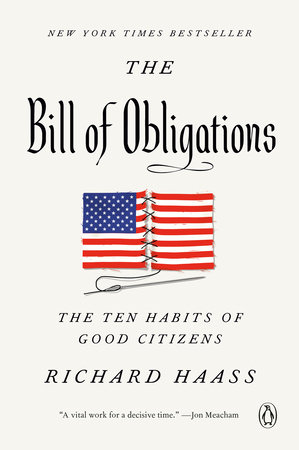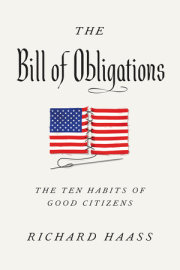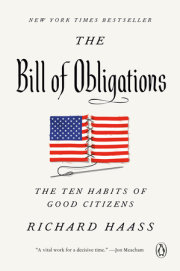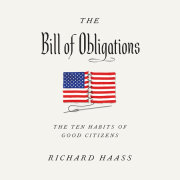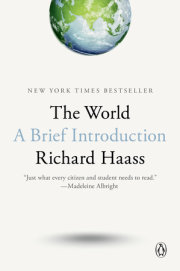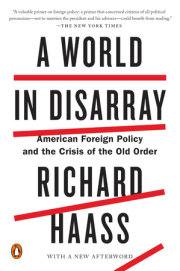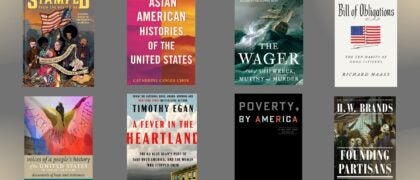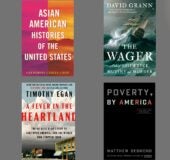PREFACE
I have spent my career studying, practicing, writing about, and speaking on American foreign policy, and a question I frequently hear is “Richard, what keeps you up at night?” Often, evenbefore I get to answer, the person posing the question suggests potential answers. Is it China? Russia? North Korea? Iran? Terrorism? Climate change? Cyberattacks? Another pandemic?
In recent years I started responding in a way that surprised me and many in the room. The most urgent and significant threat to American security and stability stems not from abroad but from within, from political divisions that for only the second time in U.S. history have raised questions about the future of American democracy and even the United States itself. These divisions also make it near impossible for the United States to address many of its economic, social, and political problems or to realize its potential. Many Americans (for a range of reasons) share my concern; according to a recent poll, a plurality (21 percent) believe that “threats to democracy” is the most important issue facing the country, surpassing cost of living, the economy, immigration,and climate change.
The deterioration of our democracy also has adverse consequences for our country’s ability to contend with Russian aggression, a much more capable and assertive China, and a host of other regional and global challenges. Deep political divisions make it difficult—or even impossible—to design and implement a steady foreign policy at a time when what happens in the world deeply affects what happens at home. Similarly, a country at war with itself cannot set an example that people elsewhere will want to emulate. If democracy fails here, democracy will be endangered everywhere. The storming of the U.S. Capitol on January 6, 2021, along with other attempts to overturn a free and fair election, made clear America’s internal divisions had reached a qualitatively different and dangerous level. There is overwhelming evidence that members of Congress as well as the then president of the United States and his close associates were not only aware of what was being planned but were intimately involved. And even though Inauguration Day took place two weeks later, even though American democracy proved resilient, the outcome might have been different had it not been for the courage and character of a few state officials, Capitol police, and the serving vice president. It was a close‑run thing—much too close for comfort.
What is more, the threat to American democracy is not limited to those who stormed the Capitol or the elected officials who cheered them on. An equally serious threat stems from the slow but steady erosion of popular support for democracy’s underpinnings.
Before going on, I should perhaps say a few things about my‑self and what motivated me to write this book. I am not particularly partisan. I have worked for one Democratic senator, one Democratic president, and three Republican presidents. I began my political odyssey as a liberal Democrat, someone opposed to the war in Vietnam. My ideas began to change when I did my graduate work at Oxford in the 1970s, during which time I studied more history, read Aleksandr Solzhenitsyn’s powerful denunciations of the Soviet system, and watched up close the illiberalism of the British Labour Party and the rise of a principled Margaret Thatcher. For most of my adult life I was a registered Republican, although in the summer of 2020 I reluctantly concluded I was no longer comfortable in that party and changed to no party affiliation. But even when I was a Republican I would at times vote for Democrats. Party was never as important to me as individual candidates and issues. As I write this, I serve as the president of the Council on Foreign Relations, an institution dedicated to being a nonpartisan resource for Americans across the political spectrum on questions of U.S. foreign policy and the country’s relationship with the world.
In short, what led to this book is not my political preferences.
I am motivated by what keeps me up at night: our democracy is imperiled, and its demise would be an incalculable loss to this country’s citizens and to the world. My belief is that it can be
saved only if Americans across the political spectrum come to accept that citizenship involves more than their asserting—or the government’s protecting—what they understand to be their
rights.
I have come around to the view that our very concept of citizenship needs to be revised, or better yet expanded, if American democracy is to survive. As two leading political scientists wrote in a classic study, “The development of a stable and effective democratic government depends upon more than the structures of government and politics: it depends upon the orientations that people have to the political process—upon the political culture.” Yes, respect for individual rights remains basic to the functioning of this or any democracy, but rights alone do not a successful democracy make. A democracy that concerns itself only with protecting and advancing individual rights will find itself in jeopardy, as rights will come into conflict with one another. When they inevitably do, it is essential that there is a path for citizens to compromise or a willingness to coexist peacefully and work with those with whom they disagree.
Beyond rights, obligations are the other cornerstone of a successful democracy—obligations between individual citizens as well as between citizens and their government. Obligations—akin
to what Danielle Allen calls “habits of citizenship”—are things that should happen but that the law cannot require. Without a culture of obligation coexisting alongside a commitment to rights, American democracy could well come undone. We need nothing less than a “Bill of Obligations” to guide how we teach, understand, and conduct our politics.
I write in full awareness that I have long been associated with the establishment—people and institutions that have often been vilified and blamed for the failures of democracy. Some of these criticisms are well‑founded. The purpose of this book is not to defend the past. It is to help build our common future, to remind readers why democracy should be cherished and suggest what could be done to preserve it. What fills these pages is a mixture of reflection and advocacy, written out of aspiration.
Implicit in all this is the conviction that American democ‑ racy is most decidedly worth keeping. The American experiment has with one obvious exception managed to sort out its differences without experiencing civil conflict on a large scale. This worthy experiment has been a sanctuary for tens of millions of immigrants fleeing persecution or seeking opportunity, and a safe harbor for political expression and religious freedom. Our nation is also an engine of innovation, creating unprecedented wealth for hundreds of millions of people and increasing average life expectancy by decades for its citizens. Beyond its borders, the United States proved central to defeating fascism in World War II, navigating a Cold War that ended peacefully and on terms largely consistent with American interests and values, and fashioning a world order that for all its flaws ended the colonial era and built international arrangements that have brought greater prosperity, freedom, and health to literally billions of people.
Yet American democracy has also come up short in meaningful ways. There is an enormous gap between the words of the Declaration of Independence—“that all men are created equal, that they are endowed by their creator with certain unalienable rights, that among these are life, liberty, and the pursuit of happiness”— and reality, including but not limited to the treatment of Native Americans and the institution of slavery and the status of women. This country has failed to adequately deal with discrimination based on race, gender, religion, or country of origin. Equal opportunity for many has been a hope rather than a reality. Nor has the country always lived up to its stated values and principles abroad, frequently supporting leaders who showed little fidelity to democratic values or the rule of law.
But progress—slow and winding—has been made over the decades toward America fulfilling its promise. The hard‑fought passage of the Thirteenth through Fifteenth, as well as the Nineteenth, Amendments to the Constitution, civil rights legislation, the legalization of same‑sex marriage—all demonstrate that this country has an ability to recognize and correct mistakes and introduce political reform and policy change. This is another built‑in advantage of democracies. Certainly more must be done, but as Winston Churchill put it, “No one pretends that democracy is perfect or all‑wise. Indeed it has been said that democracy is the worst form of government except for all those other forms that have been tried.”
The stakes for the United States and its approximately 330 million citizens are difficult to exaggerate. Inability to come to agreement on policies to strengthen American democracy has the potential to disrupt the economy and society alike. Essential public services could deteriorate or break down entirely. Political rights taken for granted could be suspended or compromised. Violence on a large scale, be it by ordinary criminals or those with a political agenda, the latter meeting the definition of terrorism, has become all too imaginable. And although an overwhelming majority of Americans oppose it, attempted secession from the union by one or more states cannot be dismissed out of hand.
Moreover, what is at stake does not end at the water’s edge, at the country’s borders. A United States that is divided and de‑ fined by politics will be in no condition to set an example that others will want to emulate. This was a theme central to President Jimmy Carter’s inaugural address: “Our nation can be strong abroad only if it is strong at home. And we know that the best way to enhance freedom in other lands is to demonstrate here that our democratic system is worthy of emulation.” The perceived failure of American democracy to function and deliver provides an opportunity for authoritarian regimes to justify their repression of their own citizens and others. In order to deter would‑be foes and provide security to friends and allies, Ameri‑ cans must be able to come together across partisan divides. Our current political atmosphere is a recipe for diminished U.S. influence, the expansion of Chinese and Russian sway, the proliferation of nuclear weapons, and increased conflict in the world. As I argued in a book published nearly a decade ago, foreign policy begins at home.
After January 6, Chinese television was filled with images of the violence and disarray at the Capitol. This is instructive. China and its government‑dominated authoritarian model would likely be the principal beneficiaries if democracy here were to fail. Those who purport to be tough on China are being anything but if they weaken democracy here in the United States. Similarly, a country paralyzed by internal divisions will be in no condition to help shape international responses to global challenges that could de‑ fine this century, including but not limited to infectious disease, climate change, the spread of nuclear weapons, and terrorism. All of this would come at great cost to Americans and to others, as little stays local for long in a globalized world.
The question is whether we the people will meet these challenges. My goal is to see that we do. My assessment is that doing so is essential, as democracy cannot otherwise be preserved. Part One of this book begins with a discussion of how rights came to occupy so central a place in American democracy and goes on to examine the mounting evidence that this rights‑based democracy is failing. Part Two of the book sets out ten obligations that, if adopted by a preponderance of citizens, would go a long way toward fixing American democracy. Putting these obligations into practice, however, is up to us.
Copyright © 2023 by Richard Haass. All rights reserved. No part of this excerpt may be reproduced or reprinted without permission in writing from the publisher.

